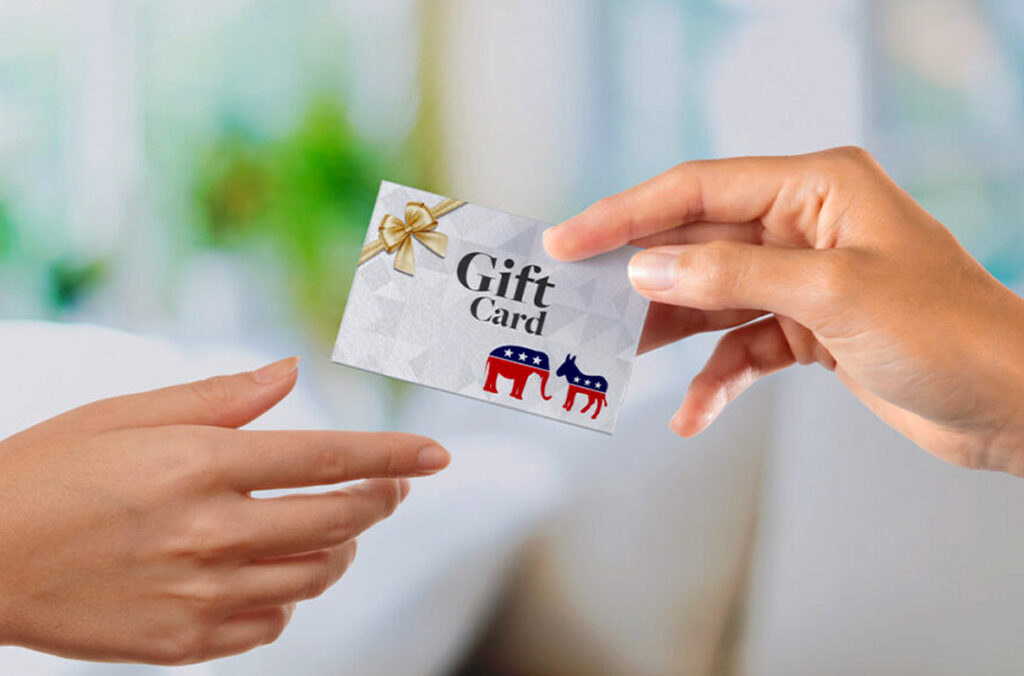PULLMAN, Wash. – Even gift cards aren’t immune from America’s sharp political divisions.
When liberals and conservatives receive gift cards for politicized brands that clash with their own views, they are less appreciative of the gift-giver’s gesture, new research indicates.
“When we started this work we wondered, ‘Does it matter? After all, it’s just a Starbucks card or a Chick-fil-A card,’” said Jeff Joireman, a marketing professor at Washington State University’s Carson College of Business, who coauthored the research.
As it turns out, it does. While people still liked getting gift cards for brands representing political viewpoints they disagreed with, their level of appreciation dropped, according to research published in the Journal of the Association for Consumer Research.
For their research, the study’s authors first asked people to describe the political orientations of 12 brands. Starbucks emerged as the most liberal brand, while Chick-fil-A was seen as the most conservative. Both were familiar brands people liked, which was important for comparison purposes, researchers said.
More than 500 U.S. residents were then asked to imagine receiving a Starbucks or Chick-fil-A card from a friend. People who strongly identified as “politically liberal” or “politically conservative” reported the strongest declines in appreciation when they received a gift card from a brand with clashing political views. The survey participants were recruited through the crowdsourcing site Amazon Mechanical Turk.
“Let’s say I’m a liberal, and my friend gives me a Chick-fil-A card,” Joireman said. “I like the Chick-fil-A card; it’s a nice gift. But I’d be more appreciative if I got a card for Starbucks, which is known for its progressive policy positions.”
Perceptions of the gift-givers’ motives also mattered. If the recipient thought the gift card was an attempt to influence their political beliefs, their appreciation dropped sharply.
Researchers tested the effect of motives by asking participants to imagine one of two scenarios: Getting the politically incompatible gift card through a gift exchange at an office party or directly from a friend who knew their political affiliation.
“If it’s just a random gift, the brand’s political orientation doesn’t matter much,” Joireman said. “But if there’s an inferred persuasion attempt, appreciation takes a big hit.”
Exchanging gifts is a common way people bond, he added. “So, if you’re buying a present for someone else, you might want to consider the brand’s political orientation.”
The researchers’ findings also offer a partial solution to the dilemma. Embedding symbols on gift cards that support the recipient’s political identity reduced the drop in appreciation for incompatible brands. Conservatives, for instance, liked getting Starbucks gift cards better when the cards had an American flag image.
“Adding the flag – a symbol of patriotism – increased the conservatives’ gift appreciation, and we didn’t get negative backlash from the liberals,” Joireman said.
“You probably could do something similar with a conservative brand, though that’s an open question,” he added. “It probably would depend on the symbol and the brand.” The journal article’s corresponding author was William Ding, assistant marketing professor at Southern Connecticut State University, who started the research during his doctoral studies at WSU. David Sprott, marketing professor and dean at Claremont Graduate University, also collaborated on the research.
Listen to Jeff Joireman talk about his research.
Media Contacts
- Jeff Joireman, WSU Carson College of Business, 509-335-0191, joireman@wsu.edu
- Becky Kramer, WSU Carson College of Business, 509-335-3977, becky.kramer@wsu.edu






